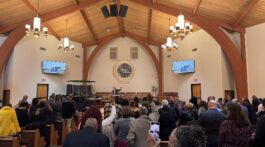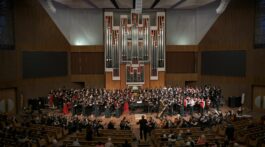Sabbath School Lesson for October 12-18, 2024
Overview and Introduction of Lesson 3, The Backstory: The Prologue
Memory Text: “In the beginning was the Word, and the Word was with God, and the Word was God.” John 1:1 KJV
The beginning of the Old Testament takes us back to the Creation story–how “In the beginning” God created our world. John follows that Creator theme in his Gospel, with a new revelation that God’s Son was the Word that spoke our world into existence. He also begins with the words: “In the beginning”. As our memory text declares, God and the Messiah, God’s Son, were together from the very beginning.
Our study of John’s Gospel began with a quick look at the end of the book, where John told us his overriding purpose for writing. He wants us to know who Jesus Christ is, and that by knowing the Son of God, we would believe and have life, both now and forever (John 20:31).
We now go back to the very start of this unique Gospel and discover John’s main theme throughout–the equality the Father had with His Son, their shared purpose and authority; but especially their mutual love and sacrifice for humanity.
Here’ how John develops his theme…
- Sunday: In the Beginning–The Divine Logos–affirming Jesus’ eternal existence
- Monday: The Word Made Flesh–the meaning of logos, meaning Word
- Tuesday: Hearing or Not Hearing the Word–many Jews rejected Jesus, they would not hear the Word
- Wednesday: Reappearing Themes–Belief/Unbelief–unbelief is a blindness for those who reject the Light
- Thursday: Reappearing Themes–Glory–the Father was glorified by His Son’s earthly life and death
Sunday: In the Beginning–The Divine Logos
The very first verse of John contains a concept that we can barely grasp. How could Jesus be with God, and yet be God at the same time? He was with God back then, but more than that, He was the One who created our world. It says so in those first three verses of John. As a matter of fact, it asserts that God’s Son, the Word, was responsible for anything that was created. Evidently, this would include anything that was created before or after our world. He merely speaks the Word, and the things of creation appear. See John 1:1-3.
It’s important for us to recognize the full deity of Christ. If He was merely human like us, He would not be able to give us eternal life. And if He were only divine, He would have an unfair advantage and not be able to be our Substitute.
Jesus was therefore fully human and fully divine. And He still carries with Him the scars in His hands to verify His connection with us (John 20:25-27). He is the exact image of God’s greatness and majesty. Which is why we can pattern our lives on His selfless example and reflect His light to others.
Bible Verses:
John 1:1-5
- What do we learn here about Jesus, the Word?
- Why is it important to recognize His deity?
Monday: The Word Made Flesh
The Greek term for “word” is logos. But in Greek philosophy, we find it referring to something between the perfect, heavenly realm and our imperfect, earthly existence. The two being far apart from each other. John directs us to God’s truth by affirming that the Word (or logos) is actually a heavenly Being, equal with God, who humbled Himself and became one of us. He’s a human/divine “go-between” for us and God.
Christianity is distinct from other world religions, where humans strive to be like the gods, for mostly selfish reasons. In Christianity, we see something different. Instead of being righteous by the works we do or don’t do to make the gods happy, we find that God actually comes down to our level and becomes one of us, which is what allows us to have a close, loving relationship with Him.
Jesus took a radical step by putting on our human flesh, in order to veil His glorious divinity and show us what He is really like. Only a loving Creator would undertake such a risky, rescue operation to free us from the evil forces that hold us captive on this planet.
Bible Verses:
John 1:1-3, 14 and Exodus 25:8
- How did God try to dwell with the Israelites of the Old Testament?
- Why was it important for the Messiah to become flesh and dwell here on earth in person?
- What kind of Father did Jesus show us, while He was here?
Tuesday: Hearing or Not Hearing the Word
John continues chapter one with a description of Jesus being the light of the world. It also tells us how He was rejected by many of His own people, the Jews. They did not welcome the light, not wanting to hear about the spiritual kingdom the Messiah came to share with them.
Paul in Romans, chapters 9-11, talks extensively about Israel’s rejection of God’s Son, the Word. They may have known the Scriptures, but they did not know Jesus, the One who inspired the prophets to write them. John does not give a totally dismal picture, however.
He tells us in John 1:12 that those who did not reject Him, who instead believed in His name, would be God’s children. That includes all of us who now believe, who have taken our stand for Christ.
We continue to have a choice about whether to hear the Word, or turn away from Him. How much better to listen and obey His word. His Ten Commandments have stood the test of time and remain a faithful guide for the development of a loving lifestyle.
Bible Verses:
John 1:4-9
- What part did John the Baptist play in preparing us to hear and accept Jesus?
John 1:10-13 and Romans 2:28-29
- How do we become a spiritual Jew?
Wednesday: Reappearing Themes–Belief/Unbelief
The verb “believe” appears 98 times in John’s Gospel (and 241 times in the entire New Testament). We have come to appreciate John’s great desire for us to believe, which is more important than just having a belief in God. James 2:19 informs us that even the devils know that God exists.
Actively believing in Jesus expresses the overriding burden John has for us to show by our actions that we believe in God, which is what makes us true Christians.
Those who are unbelievers, like the Jews who rejected Him, are blind to the fact that they are judging the Light, rather than letting His Light measure and judge them. How tragic that even the spiritual guides of Israel were so hesitant to accept the Messiah and point us to the Light of the world, like John the Baptist did. Instead they were plotting a way to get rid of the Light, which would then leave them in spiritual darkness of the worst kind.
Bible Verses:
John 3:16-21, 9:35-41, and 12:36-46
- What do these verses in John’s Gospel teach us about the importance of believing?
- How do light and darkness, seeing and blindness, fit into the John’s theme of what it means to believe?
Thursday: Reappearing Themes–Glory
When the Word became flesh and dwelt among us (as it did in the life of Jesus), we are told that we saw God’s glory (John 1:14). This glory consisted of His grace and truth.
John sums it up nicely by stating in John 1:17, “For the law was given through Moses, but grace and truth came through Jesus Christ.” In other words, the law and the sanctuary were useful ways for God to dwell with them. But the life and death of Jesus became the fullest expression of His grace and truth.
We saw God’s grace in the humiliating crucifixion Jesus suffered. He willingly did it to save all those who believe in Him. It’s ironic to realize that God’s greatest glory was revealed in such a shameful execution on the cross.
The Gospels of Matthew and Mark particularly emphasized the dark side of the cross (its humiliating shame). But we find that Luke and John focus on the glorious side–how His sacrificial death brought salvation to the world.
Bible Verses:
John 1:14-18
- Why did the Word become flesh?
John 17:1-5
- What do we find out about God’s glory, as Jesus prayed for Himself here? What was His great desire?
Friday: Final Thoughts
John started his Gospel by going back to the story of Creation. This reminds us of the importance of the Creator in all our theology. Knowing who God is, and worshipping Him in the manner He prescribed, is the foundation of the Christian faith (Revelation 14:7). The fourth commandment, found in the heart of His law (Exodus 20:8-11), was designed to remind us of our Creator. Sadly, many have forgotten the precious value of that weekly reminder, which Jesus Himself established and honored while on earth (Luke 4:16).
We are awed by the fact that the Creator of the universe humbled Himself and came to live on this planet in order to save us from the fatal grip Satan has on our lives. The love that God displayed on the cross is almost beyond our comprehension. “It softens the heart, impresses the mind, and inspires contrition in the soul…Whenever they [people] make an effort to reform, from a sincere desire to do right, it is the power of Christ that is drawing them.” ~Ellen G. White, Steps to Christ, p. 27
Next Week: Witnesses of Christ as the Messiah
To read the Sabbath School Lesson Quarterly and see more resources for its study, go to










